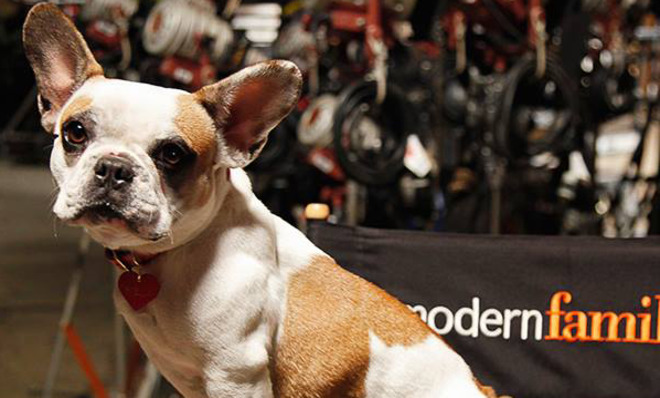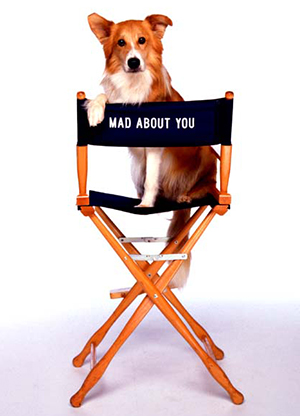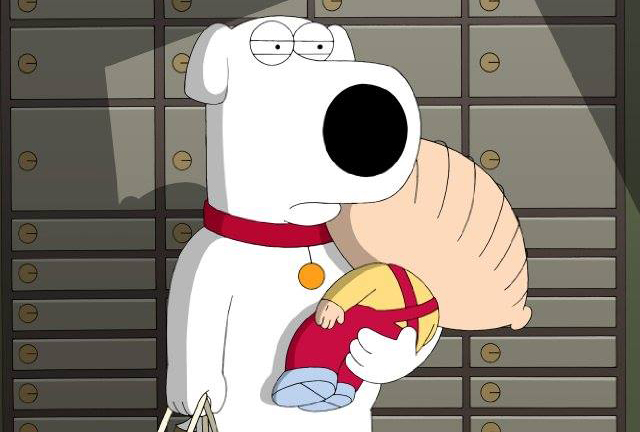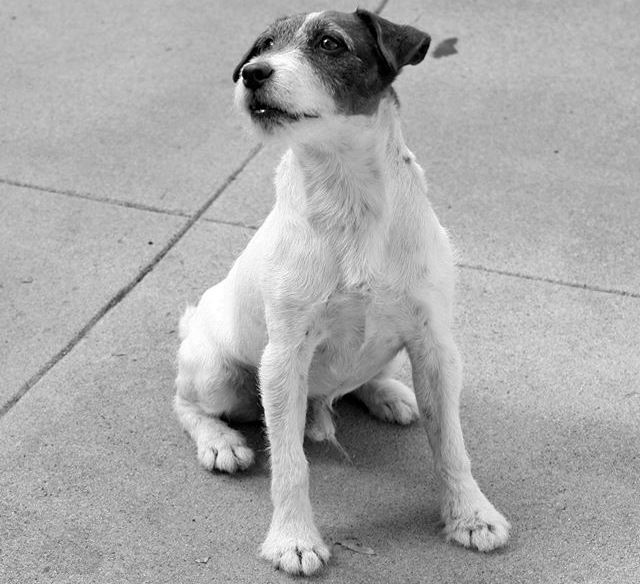Where have all the TV dogs gone?
People love dogs as much as ever. So why have sitcoms abandoned them?

A free daily email with the biggest news stories of the day – and the best features from TheWeek.com
You are now subscribed
Your newsletter sign-up was successful

Name a dog who's famous for appearing on television. No, not Lassie — a dog who's on TV today.
Got one? Good. You might be thinking of Isis, the Earl of Grantham's yellow Lab on Downton Abbey, or possibly Stella, the French bulldog spoiled by patriarch Jay on Modern Family. Digging deeper, on Parks and Recreation there's Andy and April's three-legged mutt, Champion, who can claim maybe five minutes of total screen time over six seasons. We're also told that Mike's mother on Mike & Molly owns a Brussels Griffon named Jim, whom we'd describe in further detail if we could ever bring ourselves to watch Mike & Molly.
Beyond that, there aren't very many at all — and we should point out that even the headliners we've mentioned are peripheral characters at best.
The Week
Escape your echo chamber. Get the facts behind the news, plus analysis from multiple perspectives.

Sign up for The Week's Free Newsletters
From our morning news briefing to a weekly Good News Newsletter, get the best of The Week delivered directly to your inbox.
From our morning news briefing to a weekly Good News Newsletter, get the best of The Week delivered directly to your inbox.
As Robert Thompson, a professor of television and film at Syracuse University, tells us, "The family dog has fallen upon hard times." But it wasn't always this way.
In the 1950s, dogs weren't just obligatory members of seemingly every TV family — they actually anchored their own iconic shows, like The Adventures of Rin Tin Tin and, yes, Lassie. And the '90s saw a veritable TV dog renaissance, with beloved canine characters prominently featured in network staples like Empty Nest, Married With Children, The Drew Carey Show, Spin City, 7th Heaven, Dharma & Greg, and Full House.
On Frasier, the acclaimed Cheers spinoff starring Kelsey Grammer as a radio psychiatrist in Seattle, the show's dog lead famously received more fan mail than any of the human cast members. In addition to being generally adorable, Eddie (played by a Jack Russell terrier named Moose) had a genuine gift for comedy, frequently staring down Frasier for what felt like minutes at a time. The series ran on NBC from 1993 to 2004, and Moose even inspired a 2000 "memoir," My Life as a Dog, before handing over the role to his son Enzo the same year.
"I don't think we can ever top Frasier, where the dog was so much a part of the show," says Mathilde de Cagny, Moose's trainer, who's been preparing animal actors for Hollywood productions as varied as Back to the Future, Anchorman, Marley & Me, and Hugo for the last 25 years.
A free daily email with the biggest news stories of the day – and the best features from TheWeek.com

The same could very well be said for another NBC sitcom, Mad About You, which aired from 1992 to 1999. Paul and Jamie Buchman (Paul Reiser and Helen Hunt) played a young married couple living in Manhattan. Their collie mix, Murray (Maui), had a warm, endearingly dopey demeanor that made the uptight Lassies of the world seem taxidermic by comparison.
"A lot of people watched Mad About You just because they wanted to see Murray, or because their dog looked like him or acted like him," says Boone Narr, the veteran Hollywood trainer who discovered Maui in an animal shelter. "But there aren't many dogs doing that kind of show anymore."
At the time, critics were keenly aware that furry stars were driving the TV zeitgeist. Moose made the cover of Entertainment Weekly in December 1993, then shared the cover of TV Guide with Maui the following June.
The dogs of '90s television, Thompson argues, offered a "retro feel" audiences craved, in direct reference to the comedies that came before. On Mad About You and Frasier, the foregrounded presence of dogs made unconventional family situations feel more, well, familiar. The Buchmans were happily childless (for most of the series, at least) and twice-divorced Frasier shared his apartment with his father, Martin (John Mahoney). Their pets filled an emotional void that, on domestic sitcoms past, would have been occupied by kids.
If anything, dogs carried more narrative importance in '90s television than they ever had before. For one thing, Eddie and Murray had regular male names. "Not Spot or Fido or Lassie or Rover," Thompson points out. "They were characters, equal to the human stars."
So what happened? You might think the great doggy exodus would be the result of an increased awareness of animal cruelty in entertainment, an issue at the forefront of public consciousness now more than ever. HBO's racetrack-drama Luck was abruptly canceled in 2012 after three horses were killed during production.
But this isn't the work of the Humane Society. Over the last two decades, we've experienced what Thompson calls a "complete shriveling up of the traditional family sitcom." The root of the problem, he suggests, is that there can be no family dog without a family.
"The style of so many of these shows has infantilized the characters themselves so that you no longer need a dog to stand in for an infant or child," he says. "Everyone on Two and a Half Men and The Big Bang Theory is in a state of arrested development. On Arrested Development, it's right in the title."

Thompson pinpoints November 2013 as a "symbolic moment for the end of the family dog on television," with the (temporary) death of Brian, the Griffins' dog on the Fox animated series Family Guy. "Besides, that's a dog who drinks martinis, with a higher IQ than the people in the family," he says. "He not only has a human name, but really, literally behaves like a human."
Outside the world of sitcoms, recurring roles are equally scarce. Animal performers have always been more at home in comedies than in dramas, as much for aesthetic reasons as practical ones.
"Comedy often takes place in the domestic space, where dogs are," says Thompson. "Drama takes place in the hospital or the detective agency. It's about people off doing things during the day while their dog is home waiting for them." The key to finding a place for a dog in a one-hour drama is to find him a job. A notable current example is Bear, the military-trained Belgian Malinois played by Graubaer's Boker (his website is nearly as impressive as his name) on Person of Interest, who accompanies the team on their criminal investigations.
Narr, the founder of Animals for Hollywood, a nonhuman talent agency, reports that a sizable portion of his company's TV work (its extensive credits include the canine cast members of Dharma & Greg and 7th Heaven) now takes the form of attack dogs and police dogs. But the real trainer meal ticket comes from commercials, which represent the bulk of demand for dogs. Narr attributes the decline in traditional TV work in part to the recession, which he says hit show business "extra hard."
"When you wanna keep your show running on a budget, you've got to start cutting characters," he says. "Who's going to complain the least? The dogs' agents aren't going to complain as much. And dogs are happy no matter what."
Though pay varies widely based on the nature of a project, dogs don't work cheap. Narr estimates that the total cost of a four-legged cast member — including transportation and trainers — could run between $1,500 and $2,000 per day for a one-off appearance. A "wannabe actor" might be paid a guild minimum of $700.
Pragmatic producers may also want to avoid the inevitable problem of dog longevity in the case of a long-running hit. A decade-long stint on a sitcom is one thing for a human actor, but for a dog, that's literally a lifetime. Take The Brady Bunch, for instance — the dog who played Tiger (who was also, in real life, named Tiger) was fatally struck by a car early in filming the first season. The character eventually disappeared from the show without explanation when Tiger's replacement failed to perform.
But one thing remains very clear: People love dogs as much as ever. Consider the endlessly viral capacity of YouTube videos starring cute dogs, or the rise of specialty programming like the Puppy Bowl. In recent years, canines have fared decidedly better on the big screen than the small. Marley & Me (starring Golden Retriever Clyde) made a splash at the box office in 2008, and The Artist (starring Jack Russell Uggie) claimed the 2011 Academy Award for Best Picture.

On television, children's programming has become a refuge for talented canines. If small children live in your home, you're likely familiar with Dog With a Blog, a popular Disney Channel series that is exactly what it sounds like. Moose's one-time trainer Mathilde de Cagny recently joined Nickelodeon's Nicky, Ricky, Dicky & Dawn, which gives "quite a bit" of screen time to the family dog.
And there may be better dog days ahead. Angie Tribeca, a police procedural satire starring Rashida Jones, will premiere on TBS next year — co-starring a dog. De Cagny will work with a Belgian Malinois playing a K-9 on the upcoming high-profile sitcom, which is produced and directed by Steve Carell. If the series takes off (and with that pedigree, there's no reason to think it won't), Angie Tribeca could represent a new model of success for modern TV dogs.
For his part, Narr is unfailingly optimistic about the enduring appeal that dogs hold for audiences.
"W.C. Fields said never work with kids or animals, but it's not because they're difficult, it's because they steal the scene. Walk by your TV when there's a commercial on, and if there's a dog, you'll pay attention."
This article originally appeared at Vocativ.com: Where have all the TV dogs gone?
More from Vocativ...
-
 The environmental cost of GLP-1s
The environmental cost of GLP-1sThe explainer Producing the drugs is a dirty process
-
 Greenland’s capital becomes ground zero for the country’s diplomatic straits
Greenland’s capital becomes ground zero for the country’s diplomatic straitsIN THE SPOTLIGHT A flurry of new consular activity in Nuuk shows how important Greenland has become to Europeans’ anxiety about American imperialism
-
 ‘This is something that happens all too often’
‘This is something that happens all too often’Instant Opinion Opinion, comment and editorials of the day